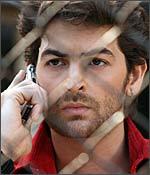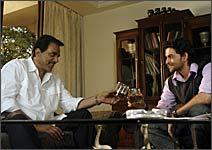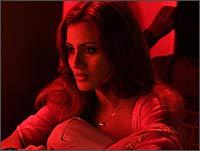Director Sriram Raghavan likes to do things his way. His first film, Ek Hasina Thi, saw Saif Ali Khan in a fabulous dark role. Last Friday's release, Johnny Gaddaar, has given us a new leading man in Neil Mukesh, and a truly fabulous soundtrack, not to mention a film that has noir buffs rather breathless.
After penning a brilliant piece on his favourite thrillers for rediff.com, Sriram talked to Raja Sen about films, and making actors act.
Before talking about JG, how do you look back on Ek Hasina Thi now?
Fondly. I mean, it has flaws, no doubt. But most people seem to overlook them. I can see them clearly. People seemed to like the movie even though it didn't do too well. And people know me because of that movie.
Every time I watch the film I look at that shot, where Saif is watching the television screen and Urmila shoots him in the back of his head and the blood hits the screen. Personally, I was always curious why you didn't end it there.
Well, she could have killed him anytime. The idea of that was in a dialogue earlier in the film. The other lady in the jail asks her if she wants to kill him after she gets out, and Urmila says 'Itni aasani se nahin.' [Not that easily] She wants to do to him what he did to her. So that's why we didn't go for that abrupt climax, and created an elaborate climax, that horrible end with the rats in the cave -- those were actually a combination of actual wild rats and pet mice, by the way.
Why did you think of Saif? He hadn't done anything dark.
I have always liked Saif. Somehow I think he never got his kind of movies. He's a certain kind of guy, and if you stuck him in a Hindi movie, the ones that were popular 10 years back, he always looked like a misfit. He would be mouthing dialogues in a certain way. There was something very intelligent and urbane about Saif, and I never liked his films other than Dil Chahta Hai. So when we were casting this film, I was very clear that we needed him. He was initially reluctant, but once he was in it, he was for it.
Is he the kind of actor who gives his own inputs to the character?
Completely. There were times when he stopped and said, 'I don't agree with this approach.' So we asked him what he wanted to do. And so we combined our ideas and created the character, after a lot of debating. He's very good at action -- not action in a typical sense, but in terms of making it realistic and believable. There's one hotel action sequence and his body language makes it work that much more.
So you're very open with suggestions and improvisations on the set?
Yeah. See, I get a feel of the actor's strengths and weaknesses and then I use them to my advantage. For example, in Yash Chopra's Deewar, the 'bhai tum sign karoge ki nahin' dialogue [by Shashi Kapoor] is something that I can't imagine any current day actor managing to pull off with such intensity. So with an actor today I have to see, first of all, can he say so much in one go and make it work? So a quieter approach might work better for a certain actor, and the same dialogue could be trimmed to two lines. So I'm open to interpretation. I have a script and a couple of days before the shooting starts, we read it out, rehearse it, and get a basic feel of the way things are, see how comfortable everyone is with it.
 As a writer, where do you start?
As a writer, where do you start?
As a writer I've to write, just that I'm not disciplined (laughs). I've not done so much that I can give you a pattern. But, for example, we're doing this Saif film next year. We have a broad idea and we put down all kinds of things that we'd like to see in a movie like that. Then there are several drafts of the actual script. It's a long process. And until the day of the shoot, I'm open to changes.
With Johnny coming out this year and Agent Vinod next year, do you see yourself as being more prolific with your output from this point on?
I hope I get prolific! I can't spend two-three years between movies. This gap happened because we had financial troubles. There was an unnatural situation with the producer and everything got stuck for six-seven months. And 70 percent of the film had been shot. Luckily, I could edit that and show it to the new producers to get financing.
After all that frustration, how do you think the film has shaped up overall?
This is a movie we've had a lot of fun with. It's just a plot, but my worry was that just a plot being executed was no fun, so gradually we started adding more elements. It's not a regular movie. The story by itself is a five guy robbery story, a B-grade story that can be done very badly or you can make a great movie out of it. It's not a serious subject; it's not My Brother... Nikhil. So we kept exploring ways to give it more texture, make it more interesting.
My inspirations are the black and white film noirs like The Asphalt Jungle,
You're mentioning slightly campy Bollywood thrillers as well as Alain Delon noir. Where does your film fit in?
It's a noir film, but hopefully it'll go through these genres. Because while it tries to be retro and 1970s, that's not all it's doing. It's got lots of thrills, but there are moody portions in the movie. I think after the first 20 minutes you'll adjust to the kind of movie it is. But initially it's going to be very 'yeh kya ho raha hai?' [what's happening?]. I could have told the story much more simply, but this way is fun.
 So is Johnny Gaddaar packaged as a multiplex film?
So is Johnny Gaddaar packaged as a multiplex film?
I hope not because I think the movies I'm talking about -- Jugnu and Dus Din -- are all commercial movies. I've not put an item song or a comedy track, but it's a very crowd-friendly movie. I don't think it's for 'that kind of an audience' or anything.
We've been seeing quite a spate of caper and heist films in India. Current filmmakers, inspired by noir, are making films that are usually disappointing and almost always heavily derivative. What's your take, are we getting over-influenced by the genre?
Yeah, I don't think we're getting anything good. Sure I go and watch them whenever I can, but I get put off when I see it's a complete copy of some foreign movie. Then again, they aren't making these films for me. Audiences might like them, they might make money. In the crime genre, I can't recently remember anything superb.
But you do think the noir genre has room in a modern Bollywood context?
Oh yes! I think the viewer's ready for now, and movie durations have also come down. So you can make a nice dark 90-100 minute film. A movie like [the Coen Brothers' first film] Blood Simple stands a great chance today.
Is Johnny Gaddaar an ensemble film?
Yeah. Five characters and their story. And everybody has a specific, vital part. Rimii Sen has a very interesting role, she's not playing a comic part. Nobody's got a very large part, but everybody has a significant part.
And your hero is a newcomer. How has that worked out for you?
I think it's an advantage. I was discussing this with Ramu [Ram Gopal Varma] and he said that in today's date, because of TV and the electronic medium and the two-month buzz built for a film release, a newcomer isn't a newcomer by the time the film releases. He isn't a completely blank new face. Sometimes the buzz builds up to actually make the actor a sort of star, with people curious to see what he does.
While watching the movie, it's a new experience. To me Neil looks good, looks soft, yet he can be edgy, can be vulnerable. He's unpredictable.
Is Neil a natural actor or was it hard to extract a performance out of him?
No, not hard. We spent three months with him, with scenes from our movie. Even though he's a Hindi-speaking guy, we all end up speaking in English. So we had to work on making that seem natural for a Hindi film. We had workshops where he got a grip of the character, which also helped me figure out how to use him. My real worry was that workshops are all well and good but when we start the film and when he meets Dharamji... I mean, it's not an easy role. So would he lose confidence? And I can't even yell at him, in case he'd get conscious. But we shot, and he was cool and confident. It went smoothly.
 How was working with Dharamji?
How was working with Dharamji?
Dharamji was great fun. He writes out his dialogues from English to Urdu. I had the impression that it'd be difficult to work with him. But he used to go over every scene and give us lots of ideas. So when I see the film, I know these bits are suggested by Dharamji and these are by Vinay Pathak.
Casting is interesting because you start out with a broad wishlist. I needed a compulsive gambler, so who were the choices? Paresh Rawal would be terrific, Boman Irani would be interesting. But when we decided we were going for a newcomer in the lead, I wanted to cast the rest of the actors who could give me the same amount of time. I didn't want a very busy actor. Vinay read the script and loved it, and like the guys I mentioned, he's the kind of actor who'll bring his own spin to the character.
So why is the film called Johnny Gaddaar? Is there anything more to it than just a Johny Mera Naam reference?
It's a homage, actually. But in the movie there's a reason why it's called Johnny Gaddaar, which I shouldn't tell you because when you're watching it you'll enjoy it more. Those who've seen Johny Mera Naam -- and I recommend the film to everyone -- will especially have a lot of fun with that thought.





